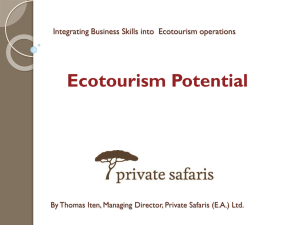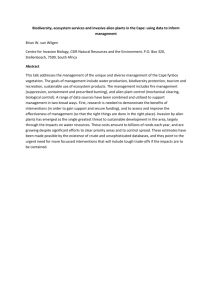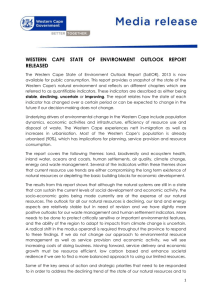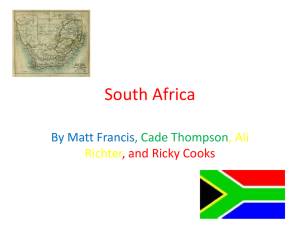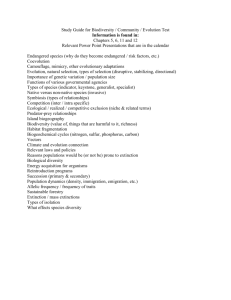For more information contact The False Bay Ecology Park (FBEP) Vision
advertisement
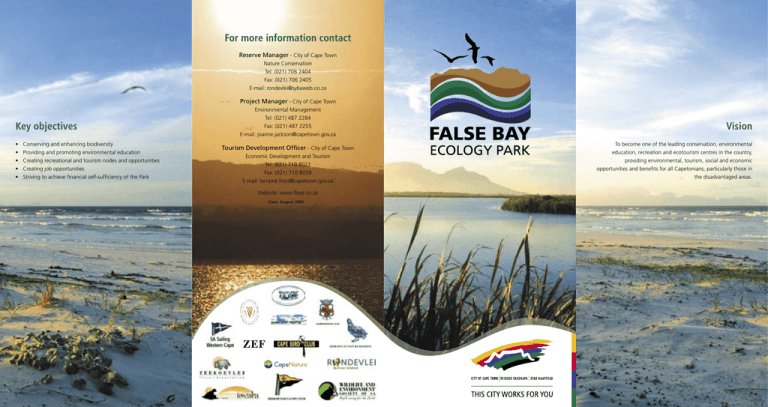
The False Bay Ecology Park (FBEP) Vision To become one of the leading conservation, environmental education, recreation and Ecotourism centres in the country, providing environmental, tourism, social and economic opportunities and benefits for all Capetonians, particularly those in the disadvantaged areas. Key objectives •Conserving and enhancing biodiversity •Providing and promoting environmental education Key objectives •Creating recreational and tourism nodes and opportunities •Creating job opportunities • Conserving and enhancing biodiversity •Striving to achieve financial self-sufficiency of the Park • Providing and promoting environmental education • Creating recreational and tourism nodes and opportunities • Creating job opportunities • Striving to achieve financial self-sufficiency of the Park For more information contact Reserve Manager - City of Cape Town Nature Conservation Tel: (021) 706 2404 Fax: (021) 706 2405 E-mail: rondevlei@sybaweb.co.za Project Manager - City of Cape Town Environmental Management Tel: (021) 487 2284 Fax: (021) 487 2255 E-mail: joanne.jackson@capetown.gov.za Tourism Development Officer - City of Cape Town Economic Development and Tourism Tel: (021) 710 8022 Fax: (021) 710 8039 E-mail: lorraine.frost@capetown.gov.za Website: www.fbep.co.za Date: August 2005 Vision To become one of the leading conservation, environmental education, recreation and ecotourism centres in the country, providing environmental, tourism, social and economic opportunities and benefits for all Capetonians, particularly those in the disadvantaged areas. Threats Biodiversity A number of issues related to urbanisation and safety and security threaten • The biodiversity in the FBEP’s small geographic area is unique. the attainment of the vision for the FBEP. The greatest threat currently to the • The Park is an important node in the City of Cape Town’s Biodiversity integrity of the Park is the proposed R300 toll road. The City, in partnership with a number of other organisations involved in the project, are actively working Network and forms a link between the Table Mountain – Peninsula Mountain Chain and the False Bay coast. Location & Concept • The Rondevlei Nature Reserve (established in 1952) is home to: - 320 plant species: 17 endangered, 2 endemic The False Bay Ecology Park (FBEP) covers 1 200 ha and includes the Rondevlei - 235 recorded bird species: 7 are endangered Nature Reserve, Zeekoevlei Nature Reserve, the Cape Flats Waste Water Treatment - 29 reptile species Works (CFWWTW), the Coastal Park Landfill site and a section of coastal strip. - 23 mammal species Pelican Park, to the east, and Capricorn Park, to the west, are of great botanical - 8 amphibian species: 2 of which are endangered importance and seen as future extensions of the FBEP. - Hippopotamuses – the Cape’s only hippopotamus population The components of the park, whilst not easily reconciled with the idea of a prestine • towards mitigations of these issues that pose a threat to achieving Socio-economic importance the vision and objectives of the FBEP. • The FBEP has the potential to become the most important multi-purpose open space in Cape Town. • The Park provides vital ecosystem services, treatment and disposal of waste, a green lung in the City and opportunities for recreation, ecotourism, social and economic upliftment. • Environmental education programmes are run from the Rondevlei Nature Reserve and the Zeekoevlei Environmental Education Project (ZEEP). A new False Bay Ecology Park Environmental Education Centre is being established between Zeekoevlei and the The ponds of the Cape Flats (Strandfontein) Wastewater Treatment Works CFWWTW. These educational programmes allow learners from diverse backgrounds to experience nature and highlight ‘green’ “Nature Reserve”, reflect the ecological cycle present in our city: Extraction; form a vital part of the FBEP and provide a rich, semi-natural habitat for and ‘brown’ environmental issues. production; consumption; decomposition, hence the name “Ecology Park”. many bird species. The most recent bird count recorded was 30 145 birds. Many rare sightings, as well as endangered birds are to be seen here. • top five bird watching areas in Southern Africa. Ecotourism, based on the important natural resources of the area, provides opportunities for job creation and economic empowerment. Imvubu Nature Tours, a community-based tourism company runs a successful conference facility, accommodation, Migratory birds use the FBEP as a ‘staging post’ along their migratory route. Getaway Magazine rated the wetland systems of the FBEP amongst the • • boat trips and tours in the FBEP. There is great potential for niche market birding and carp-fishing tourism. • Recreation on land and water is a key feature of the FBEP including walking, fishing, swimming and surfing along the coastal strip. Activities such as fishing, sailing, kayaking and canoeing take place at Zeekoevlei. In the future, the eastern shore of The area is listed as an Important Bird Area (IBA) of South Africa. Of the Zeekoevlei will provide ample facilities for picnicking and braaiing. Birdwatching is a popular activity at Rondevlei, and 168 bird species recorded here, 76 are freshwater wetland species and 18 the CFWWTW and Rondevlei also offer short hiking trails, a live reptile display and an aquarium. are coastal species that visit the area to roost or breed. The high diversity of water birds is due to the wide range of wetland habitats and the IBA’s • proximity to the ocean – which allows freshwater and coastal species to make use of the system. An ecovillage and camping area are envisaged within the Park, demonstrating sustainable building technologies and living practices. • CAFDA (the Cape Flats Development Association) is developing the Stables Craft and Culture Centre, which includes a restaurant, arts and crafts and an information and historical centre for the benefit of the local community. A clear link between CAFDA and Rondevlei is planned for the future.

